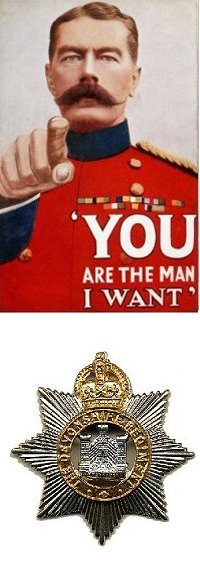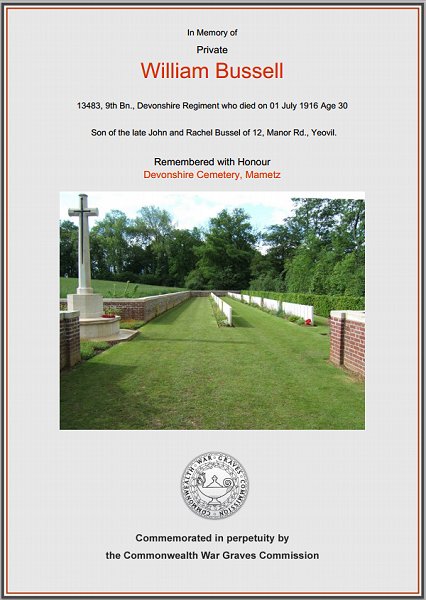yeovil at War
William Bussell
Killed in action on the first day of the Somme
William Bussell, known as Willie, was born in 1886 at Poyntington, seven or eight miles west of Yeovil. He was one of the younger children of the 14 children of dairyman John Bussell (1840-1924) and Rachel Rice née Luxton (1844-1906) both originally from Devon.
In the 1891 census John and Rachel were living in Sparrow Lane (today's Sparrow Road) with 5-year old Willie and five of their other children. Ten years later the census listed John and Rachel living at 4 West Coker Road with sons William and John. John Snr gave his occupation as a Foreman on a Farm while both the boys, aged 15 and 14 respectively, were employed as Printer's Clerks and both were working at the Western Gazette at Newton Road. William worked in the clerical department at the Western for seventeen years.
 It
is not known
when William enlisted in the
Army, but he is
known to have
enlisted at
Yeovil and gave
his birthplace
as Yeovil. He
enlisted in the
Devonshire
Regiment
(Service No
13483). From the
notice of his
death published
in the Western
Gazette it is
known that he
was in one
battalion but,
after being
hospitalised
with a knée
injury in
France, his
battalion had
moved on by the
time of his
recovery. He was
then transferred
to the 9th
(Service)
Battalion,
Devonshire
Regiment.
It
is not known
when William enlisted in the
Army, but he is
known to have
enlisted at
Yeovil and gave
his birthplace
as Yeovil. He
enlisted in the
Devonshire
Regiment
(Service No
13483). From the
notice of his
death published
in the Western
Gazette it is
known that he
was in one
battalion but,
after being
hospitalised
with a knée
injury in
France, his
battalion had
moved on by the
time of his
recovery. He was
then transferred
to the 9th
(Service)
Battalion,
Devonshire
Regiment.
Details of his military service are consequently obscure and the only positive information concerns the action in which he was killed. The 9th Battalion, Devonshire Regiment was part of 20th Brigade, 7th Division and took part in the first day of the Battle of the Somme.
The first day on the Somme, 1 July 1916, was the opening day of the Battle of Albert (1–13 July 1916). Nine corps of the French Sixth Army, as well as the British Fourth and Third armies, attacked the German Second Army from Foucaucourt on the south bank to Serre, north of the Ancre and at Gommecourt 2 miles (3.2 km) beyond. The objective of the attack was to capture the German first and second positions from Serre south to the Albert–Bapaume road and the first position from the road south to Foucaucourt. The German defence south of the road mostly collapsed and the French had "complete success" on both banks of the Somme, as did the British from Maricourt on the army boundary, where XIII Corps took Montauban and reached all its objectives and XV Corps captured Mametz and isolated Fricourt.
The village of Mametz was attacked by the 7th Division, which on the right had only 100–200 yards (91–183 m) of no man's land to cross. The infantry advanced behind a creeping field artillery barrage, lifting slowly according to a timetable, towards a standing barrage fired by the heavy artillery, which lifted to the next objective at set times. The right and central brigades attacked on a 1,800-yard (1,600 m) front, from support trenches behind the British front line. Crossing no man's land led to few casualties but far more were inflicted, as the battalions advanced uphill 700 yards (640 m) to the village. The east end of the village was captured but several attempts on the north and west ends were repulsed. After a series of bombardments and when British troops further south began to menace the supply routes of the garrison, resistance collapsed and the village was occupied.
The west side of the village was attacked by the 20th Brigade which had to fight forward for most of the day, before the infantry pushed on to ground facing Mametz Wood and the Willow Stream, outflanking Fricourt to the north, though the objectives further beyond Mametz was not reached. Much of the front of the 7th Division was opposite Reserve Infantry Regiment 109 of the 28th Reserve Division, which should have been relieved on the night of 30 June and which received a warning of the attack from a listening station at La Boisselle. Most of the regiment was caught in the deep shelters under the front trench and cut off from telephone communication. Most of the supporting machine-guns and artillery was put out of action early on. Reinforcements were sent to the second position but not ordered to counter-attack due to uncertainty about the situation at Montauban and the need to secure Mametz Wood. The 7th Division had 3,380 casualties, including William Bussell. He was aged 30.
On 21 July 1916 the Western Gazette reported "His many friends in Yeovil and district will hear with feelings of deep regret the news has been received that Private William Bussell of the Devonshire Regiment, whose father resides at 19 Manor Road, has been killed in action in the recent advance. Private Bussell joined the Colours some time after the commencement of hostilities, and was in training twelve months before going on active service. Soon after his first spell in the trenches an accident occurred to his knée, which necessitated his removal to hospital and in the meantime his original battalion was drafted elsewhere, and he was attached to another. He had been on duty in the trenches, on and off, since he had been on active service. His letters to friends of his experiences, which were cheery and interesting, always contained a note of modesty. Private Bussell was employed in the clerical department of the “Western Gazette” for over 17 years where he was held in the highest esteem by his colleagues. He was captain of the office cricket team the same year as war broke out, and was an active member of the club for many years, taking a great interest in other sports. Priv. Bussell was also a member of the Conservative Club, and was secretary of the Junior Imperial League for some time. By his general manner he endeared himself with those with whom he came into contact."
William was interred in the Devonshire Cemetery, Mametz, France, Grave B6, and his name is recorded on the War Memorial in the Borough.
gallery

The Commonwealth War Graves Commission certificate in memory of William Bussell.